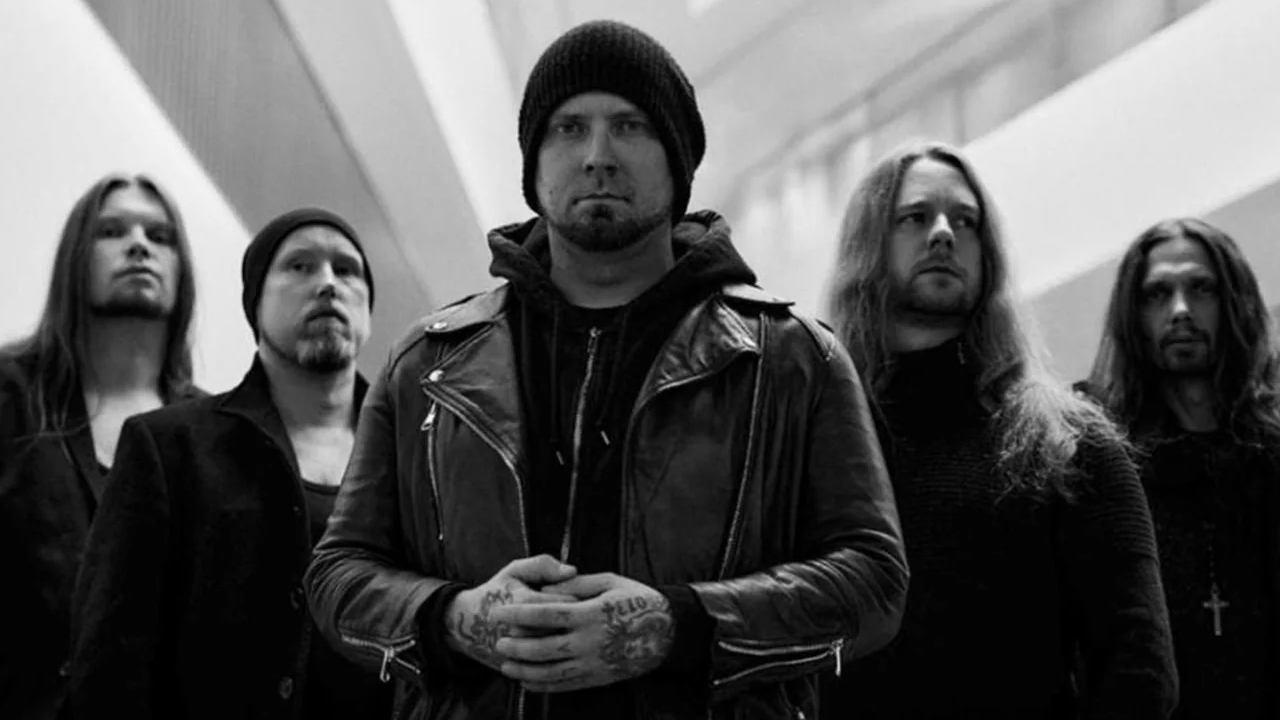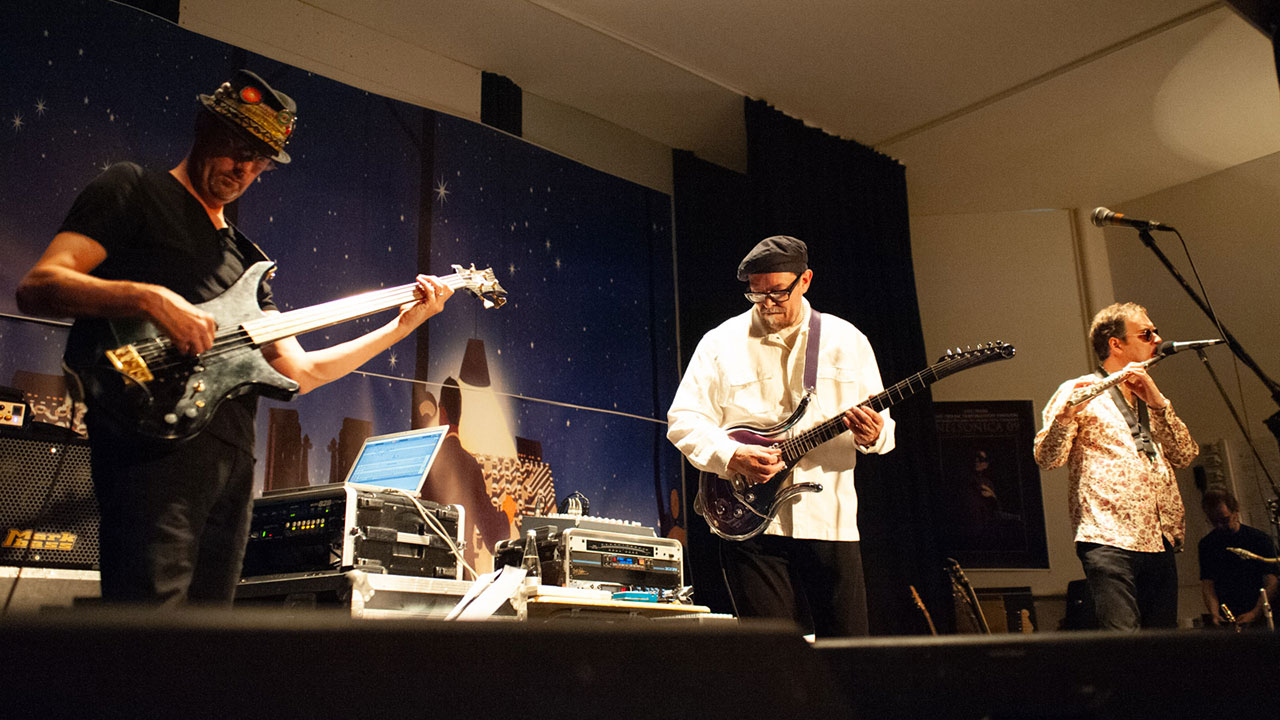“I hate that I had to write the previous album. It became dangerous to play the music and stab myself in the heart”: Swallow The Sun had to escape from Juha Raivio’s personal hell. The solution was new album Shining
Finnish prog-doomers’ ninth record contains elements of Queen, Marillion, Metallica’s Black Album and pop production – but most of their mesmerising melancholy remains

As they head towards their 25th anniversary, Finnish prog-doom merchants Swallow The Sun are bringing a touch of hope to their more melancholic output with the transformative new album, Shining. Bandleader Juha Raivio discusses their brighter sound, Marillion’s influence and why the record is going big with Queen-style choruses.
Swallow The Sun’s new album, Shining, is aptly named. It isn’t exactly bursting with joy – the Finnish quintet are far too steeped in melancholia for that – but it does provide glimmers of hope that shine like distant stars in the darkness. It’s also an album that guitarist, keyboard player, founder member and main songwriter Juha Raivio felt that he had to make at this point in the band’s career.
“I needed it to feel different to our last album for my own sake, because Moonflowers was so dark,” he explains. “It was so painful. Anyone who knows us knows the music has a lot of weight from my own personal life. It started to be quite dangerous for myself, to play the music and go on tour and stab myself in the heart. A voice inside myself said that maybe you could have a little bit of mercy with yourself if there’s ever going to be new music.”
For those who aren’t familiar with Swallow The Sun’s recent history, their last two albums – 2019’s When A Shadow Is Forced Into The Light and 2021’s Moonflowers – dealt directly with the death of Raivio’s partner and artistic collaborator, Aleah Stanbridge, and the guitarist’s own difficult journey in its aftermath.
“When A Shadow Is Forced Into The Light was made from love, pure love. I love that album. But I fucking hate Moonflowers. I hate that I had to write that album,” he says.“Aleah told me, ‘You have to face the darkness. Don’t have any fear – just go straight into the darkness because the light is on the other side.’ But I got so deep that I kind of passed the point where the light was; I was going even deeper into that direction. I was hoping with this new album that I would feel some kind of power rather than lying in that coffin.”
Shining does take a different tack. If the lyrics aren’t exactly suffused in light, they at least question and start to arrest that descent into darkness. Album opener Innocence Was Long Forgotten looks backwards with a darkly romantic lustre. What I Have Become takes a long, hard look into an unforgiving mirror, while MelancHoly warns of the dangers, as Raivio puts it, of “making melancholy your god.”
“People think I’m some kind of goth, weeping in a forest and drinking red wine,” he says. “That’s part of how I express myself through the music – but there has always been a hope in me, and both light and darkness. It’s very powerful in me. I sound like a fucking Jedi, but we all have that duality.”
Sign up below to get the latest from Prog, plus exclusive special offers, direct to your inbox!
There are themes of rebirth, or at least a vigorous reassessment, that go beyond the lyrics too. Even the album artwork provides a marked contrast, with gleaming jewelled hands forming a transformative moth shape. It’s a far cry from Moonflowers, which saw the guitarist pour his pain – quite literally – into the minimalist aesthetic.
“I painted the Moonflowers cover with my own blood,” he nods. “I cut myself up just to paint the album. With the new one, you’re the first one who got it, but it’s the moth from our logo. It’s also two swans, and there’s a brightness with the diamonds and the whiteness of the image. It feels powerful: the kind of change I was hoping for.”
Along with these thematic and aesthetic changes, the band decided to take a different musical approach to their ninth full-length studio album. Bassist Matti Honkonen has described Shining as the Finns’ own Black Album, and while his tongue was at least partially in his cheek, the comparison might still be alarming for fans of their more progressive leanings.
Metallica’s self-titled record was, after all, a far more streamlined take on their sound that became a huge mainstream hit, even as it alienated sections of their fanbase. Even more alarm bells might have sounded on the announcement of producer Dan Lancaster, whose production and mixing credits include Blink-182, Don Broco and Bring Me The Horizon.
I wanted Shining to have more power – and the mix feels like someone punching you in the face
“Matti was joking in part, but in a way it’s true, because the genre can be very... protective,” Raivio chuckles. “Like with the Black Album, lots of ‘true’ Metallica fans thought, ‘I want my Metallica to be exactly like this.’ We’re not into labels. People call us doom metal, and there is some of that in there; but we have melody and growling and slow tempos and long songs and short songs. People never know what to expect from us.
“I wanted a producer with a fresh perspective who’s never done this kind of music. Dan didn’t change the songs, but I wanted Shining to have more power – and the mix feels like someone punching you in the fucking face. He helped pull the melody out more than ever before and he also sings a lot, adding backing vocals and harmonies. You might want to hang me by my balls for saying this, but he brought a lot of Queen to the band with the big vocal choruses.”
We’ll pass on that, thanks; but there’s a sense of immediacy and even bombast to Shining that certainly wasn’t present on its understandably downbeat predecessors. At the same time it’s recognisably a Swallow The Sun album, and long-term fans needn’t worry that they’ve morphed into a shiny pop-rock outfit. Despite the more optimistic tones, the gloomy melancholia remains. “It’s part of the Finnish people,” says Raivio with a laugh. He’s a man who lives alone in the woods with a beautiful Norwegian forest cat (who makes a scene-stealing appearance on our video call) for company.
I wish I didn’t have to write this music myself; so in that respect, I feel sorry for the people who like my band
The progressive elements are also ingrained, shining through the melodic layers of Under The Moon & Sun and the nine-minute title track which closes the album. “There’s so much Marillion in this band. We had Steve Rothery play with us [on 2009’s New Moon] and he’s my main influence as a guitarist,” Raivio says.
“Some prog fans might be like, ‘What is this asshole talking about?’ but it’s in there. We have a 34-minute song [2008’s Plague Of Butterflies]; and even I played in a progressive band through the 90s. We’d play these underground prog parties in Helsinki.”
It’s now nearly a quarter of a century since he helped put Swallow The Sun together. In that time they’ve become a respected and occasionally revered band, but their continued presence in the prog metal scene is never a given.
“Every album is the last album for me in a way, because I can never be sure that the inspiration will come again,” Raivio explains. “I live here in my godforsaken forest and I wait. When the music comes, it comes in a flood and I write the whole album in a month. So far it’s always happened – but who knows if it always will?”
And if Shining should become their Black Album, in terms of a surge in popularity, would any of that change? “I still wouldn’t be able to plan music or write to a schedule. It’d certainly be amazing if more people found the band; but in some ways, even with the new album, I think you have to have lived it, to have loved and lost to really resonate with the music.
“I wish I didn’t have to write this music myself; so in that respect, I feel sorry for the people who like my band and I’m happy for the ones who don’t.”
Paul Travers has spent the best part of three decades writing about punk rock, heavy metal, and every associated sub-genre for the UK's biggest rock magazines, including Kerrang! and Metal Hammer.




